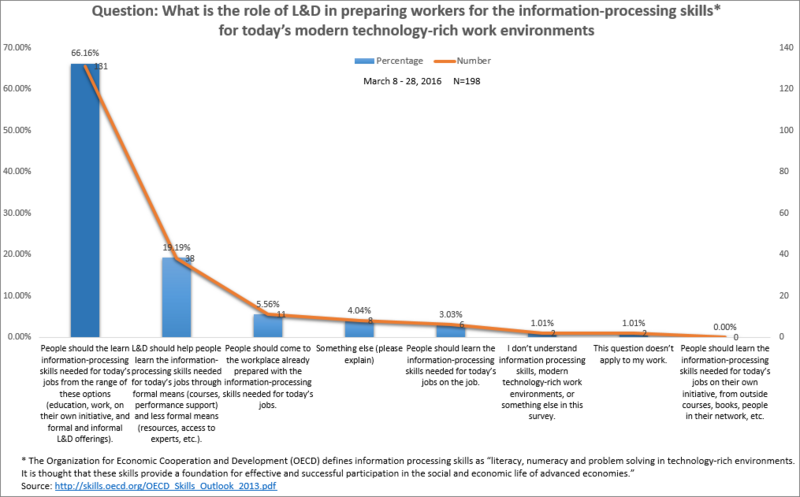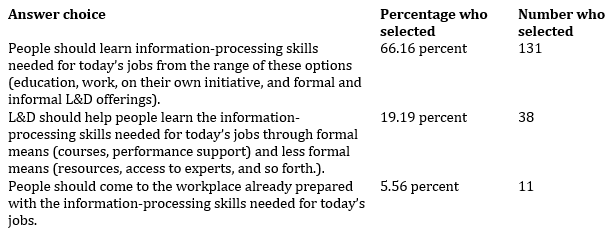ATD Blog
One Minute, One Question: How People Learn Critical Information Processing Skills
Thu Mar 31 2016

In early March 2016, we asked readers from several ATD communities to answer a One Minute, One Question Survey about how people should learn critical information-processing skills for today’s modern, technology-rich work environments.
The reason for asking this complex question is that the Organization for Economic Cooperation and Development (OECD) says that these skills “provide a foundation for effective and successful participation in the social and economic life of advanced economies.” The OEDC is an organization that helps governments work together to seek solutions to difficult problems. Its Survey of Adult Skills examined how what adults “can do” affects their life chances.
The OEDC study found that median wage is 60 percent higher for people who can do certain types of mental work than for workers who cannot. Those with low literacy of all types (digital, information, reading, numeracy) are twice as likely to be unemployed or underemployed.
Therefore, when discussing “information processing skills,” the OEDC data isn’t simply discussing the ability to turn on and use a computer or the Internet, it’s addressing higher level work skills, such as the ability to read AND get meaning from complex writings, the ability to evaluate truth claims and arguments written in lengthy writings, the capacity to make complex inferences, and the skill to use productivity-improving technologies and complex work practices.
What’s more, the OECD study found that most of the workers in the United States and other countries, such as Germany, France, Spain, and the United Kingdom, are below average in these critical skills (see Figure 0.2 in the report), and that should be concerning for today’s L&Ders.
Other reports also tell us that “skill instability” is the new norm. In other words, because of a variety of factors, such as rapid technology changes and globalization, almost everyone has to be prepared to learn additional skills—all the time. (I’ll explain more about this in a new article very soon.)
Let’s take a look at how the 198 respondents answered ATD’s One Minute, One Question Survey.


Given today’s business environment, it’s no surprise that two-thirds (66.16 percent) of respondents to the ATD survey responded that workers must learn their information processing skills from the entire range of options.
While L&D should help people learn the information-processing skills needed for today’s jobs, that avenue alone absolutely won’t be enough, according to experts. And data from the One Minute, One Question Survey concurs; only one-fifth of respondents say people can learn the information-processing skills needed for today’s jobs through formal means, such as courses and performance support. Because of the increasing rate of change, though, courses may be too little, too late. Consequently, L&D’s role is likely to change—and they also will have to learn new skills.
As for people coming to the workplace already prepared? Research shows that most of what people learn prior to the job (including in higher education) may be out of date by the time they hit the workplace.
Welcome to the new world of work. Don’t be scared. Be prepared.
For ATD Members only: Hear Patti discuss the results of this month’s survey in more detail.
You've Reached ATD Member-only Content
Become an ATD member to continue
Already a member?Sign In
